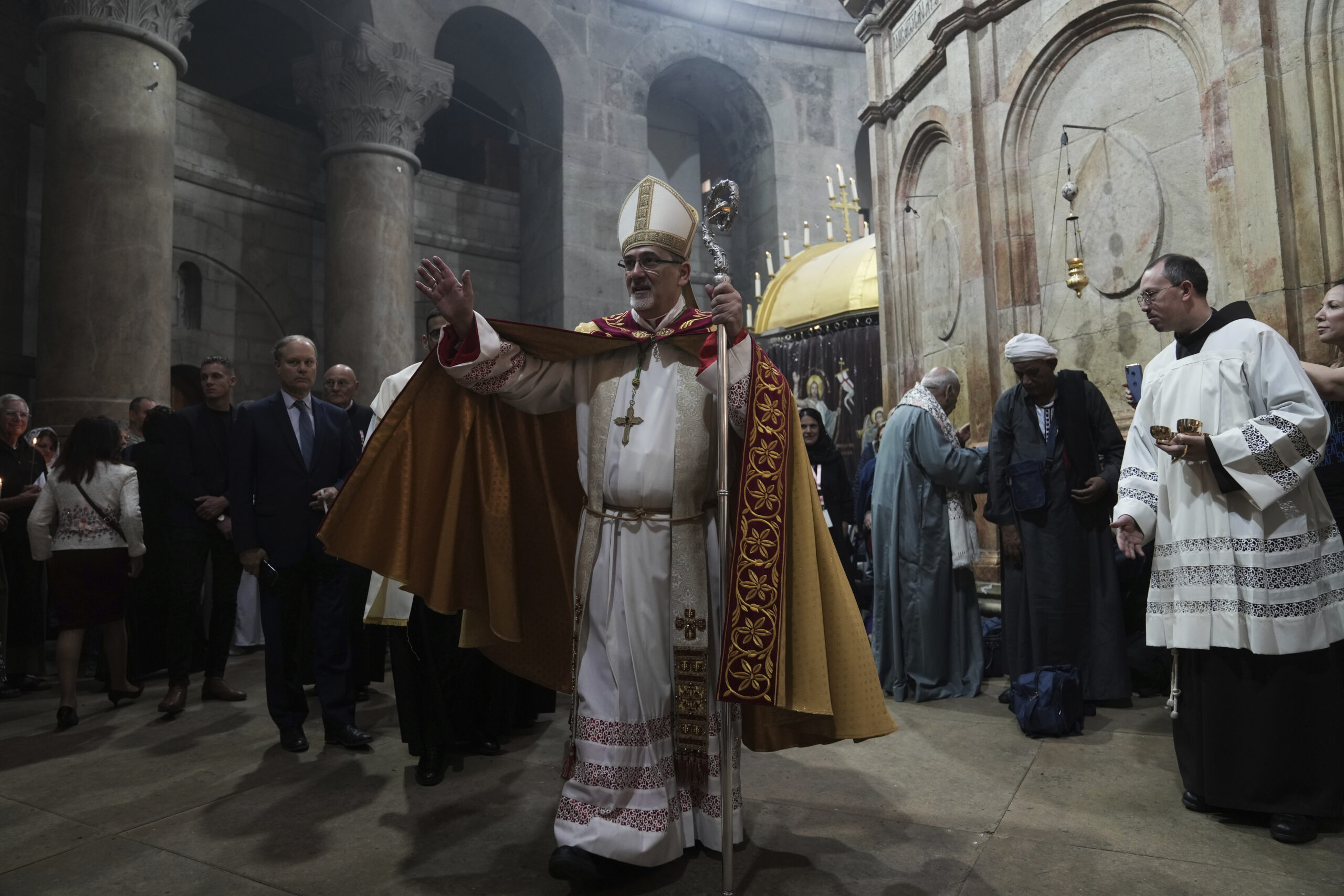
(RNS) — The Israeli government, already criticized the world over for its brutal handling of Muslim worshippers at the Al-Aqsa Mosque, appears to be bent on proving that it is an equal opportunity violator of religious freedom. The Netanyahu administration is now being accused of violating the Christian faithful’s right of worship.
Three major faiths’ holy days of Ramadan, Passover and Western Christianity’s Easter overlapped in Jerusalem this spring. Easter for the Orthodox Christian church, which follows the old Julian calendar, is on Sunday (April 16). But the Israeli authorities are imposing restrictions on how many Palestinian Christians, a large number of whom are Orthodox, can attend the annual Holy Fire ceremony held on Saturday.
Eastern Orthodox Christians believe that on the Saturday before Easter, a miraculous flame appears inside the Church of the Holy Sepulchre, the traditional site of Jesus’ tomb. The Orthodox patriarch enters the Holy Edicule, a chamber built over the tomb, and emerges with two lighted candles. He passes the flame among thousands of people holding candles, gradually illuminating the walls of the darkened basilica.
A week ago, however, the Israeli army unilaterally rescinded travel permits it had approved for 739 Palestinian Christians from the Gaza Strip. This might lead one to conclude that it is wary after Islamic Hamas fired a number of rockets at Israel from Gaza following the attacks on Muslim worshippers earlier this month.
But there was no attempt by Israel to blame Gazan Christians for the Hamas rockets, and the rationale the Israeli authorities gave for the clampdown was that they want to prevent a repeat of a 2021 disaster that left 45 people dead after a crowd stampeded at a packed Jewish holy site.
As with most Israeli meddling with rights guaranteed under the status quo agreement, supposed safety concerns look to many like a cover for depriving minority faiths of their freedom to worship. This decision in particular comes as anti-Christian attacks have seen an uptick under the Netanyahu regime, the most right-wing Israeli government in living memory.

Latin Patriarch of Jerusalem Pierbattista Pizzaballa leads the Easter Sunday Mass at the Church of the Holy Sepulchre in the Old City of Jerusalem, April 9, 2023. Since the rise of Israel’s most right-wing government in history, church leaders say the 2,000-year-old Christian community in Jerusalem has come under increasing attack, with an uptick in harassment of clergy and vandalism of religious properties. Several church leaders, including the head of the Roman Catholic Church in the region, told The Associated Press they fear that Prime Minister Benjamin Netanyahu’s ultranationalist coalition has empowered extremists. (AP Photo/Mahmoud Illean, File)
In recent months an Anglican cemetery has been vandalized, church statues have been toppled and Jewish radicals have attempted to torch the Church of Gethsemane. Christian clergymen in Palestine have been under attack since the beginning of the year, with about 80 physical and verbal assaults being recorded in the first three months of 2023.
In February, the United Nations Security Council was moved to adopt a presidential statement that for the first time in a U.N. document cited Christianophobia along with antisemitism and Islamophobia.
The president of the council, a United Arab Emirates diplomat named Lana Nusseibeh, comes from a Muslim family in Jerusalem that has held the keys to the Church of the Holy Sepulchre for over 850 years, with the consent of Christians, in order to overcome the differences between Christian churches.
The Orthodox Church has called the restrictions on Christian worshippers “heavy-handed,” and Christian leaders point out there’s no need to alter a ceremony that has been held for centuries without problems. They note that the stampede occurred when a makeshift wooden stage collapsed. The entire area of the Church of the Holy Sepulchre and its yards are made of stones.
The status quo is a 19th-century Ottoman agreement regulating the administration of Christian holy sites by determining the powers and rights of various denominations in these places. The most important of these decrees was an 1852 firman by the Ottoman Sultan Abdulmejid I, which preserved the possession and division of Christian holy sites in Jerusalem and Bethlehem and forbade any alterations to the status of these sites.
Jordan, whose royal Hashemite family is accepted regionally as the custodian of Christian and Muslim holy places in Jerusalem, is supported in its responsibility by the Palestinian government and church leaders.
But negotiations between church officials and the Israeli police have broken down. “After many attempts made in goodwill,” Patriarch Theophilos III of Jerusalem said, “all efforts at reaching an agreement with the Israeli police have failed,” adding that the “unreasonable restrictions will limit access to the Church of the Holy Sepulchre and to the Holy Light ceremony.”
Police officials acknowledged that they will block some routes into the Old City and that attendance will be limited in the ancient church and courtyard. But in a conference call with reporters, officials said the attendance limits — 1,800 people inside the church, which Greek Orthodox officials said was a fraction of previous years — were set by the church.
Freedom of religion and its practice are rights guaranteed by international law. The Fourth Geneva Convention regulates how an occupying power must behave, namely that it respect the status quo.
(Daoud Kuttab is an award-winning Palestinian Christian from Jerusalem. The views expressed in this commentary do not necessarily reflect those of Religion News Service.)
